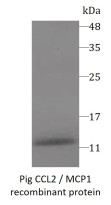ARG70445
Pig CCL2 / MCP1 recombinant protein (His-tagged, N-ter)
Pig CCL2 / MCP1 recombinant protein (His-tagged, N-ter) for SDS-PAGE
Overview
| Product Description | E. coli expressed, His-tagged (N-ter) Pig CCL2 / MCP1 recombinant protein |
|---|---|
| Tested Application | SDS-PAGE |
| Target Name | CCL2 / MCP1 |
| Species | Pig |
| A.A. Sequence | Gln24 - Pro99 |
| Expression System | E. coli |
| Protein Full Name | C-C motif chemokine 2 |
| Alternate Names | CCL2; C-C Motif Chemokine Ligand 2; MCP-1; MCP1; MCAF; HC11; Monocyte Chemotactic And Activating Factor Monocyte Secretory Protein JE; SMC-CF; GDCF-2; SCYA2 |
Properties
| Form | Powder |
|---|---|
| Purification Note | Endotoxin level is less than 0.1 EU/µg of the protein, as determined by the LAL test. |
| Purity | > 98% (by SDS-PAGE) |
| Buffer | PBS (pH 7.4) |
| Reconstitution | It is recommended to reconstitute the lyophilized protein in sterile water to a concentration not less than 200 μg/mL and incubate the stock solution for at least 20 min at room temperature to make sure the protein is dissolved completely. |
| Storage Instruction | For long term, lyophilized protein should be stored at -20°C or -80°C. After reconstitution, aliquot and store at -20°C or -80°C for up to one month. Storage in frost free freezers is not recommended. Avoid repeated freeze/thaw cycles. Suggest spin the vial prior to opening. |
| Note | For laboratory research only, not for drug, diagnostic or other use. |
Bioinformation
| Gene Symbol | CCL2 |
|---|---|
| Gene Full Name | C-C Motif Chemokine Ligand 2 |
| Background | This gene is one of several cytokine genes clustered on the q-arm of chromosome 17. Chemokines are a superfamily of secreted proteins involved in immunoregulatory and inflammatory processes. The superfamily is divided into four subfamilies based on the arrangement of N-terminal cysteine residues of the mature peptide. This chemokine is a member of the CC subfamily which is characterized by two adjacent cysteine residues. This cytokine displays chemotactic activity for monocytes and basophils but not for neutrophils or eosinophils. It has been implicated in the pathogenesis of diseases characterized by monocytic infiltrates, like psoriasis, rheumatoid arthritis and atherosclerosis. It binds to chemokine receptors CCR2 and CCR4. Elevated expression of the encoded protein is associated with severe acute respiratory syndrome coronavirus 2 (SARS‐CoV‐2) infection. |
| Function | Signals through binding and activation of CCR2 and induces a strong chemotactic response and mobilization of intracellular calcium ions. |
| Cellular Localization | Secreted |
| PTM | Disulfide bond, Glycoprotein, Pyrrolidone carboxylic acid |
Images (1) Click the Picture to Zoom In






